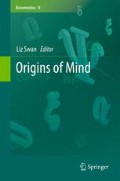Abstract
Abstract Discovering an adequate explanation for the evolution of consciousness has been described as “the hard problem” about consciousness that we would like to understand. The difficulty becomes compounded by the introduction of such notions as the unconscious or the preconscious as its counterparts, at least for species of the complexity of human beings. An evaluation of the prospects for unconscious factors as exerting causal influence upon human behavior, however, depends upon understanding both the nature of evolution and the nature of consciousness. This paper sketches a theoretical framework for understanding both phenomena in general with regard to their various forms and suggests the evolutionary function of consciousness in genetic and in cultural contexts. It becomes increasingly apparent that, given a suitable conceptual framework of minds as semiotic systems, the evolution of consciousness may not be such a “hard problem”, after all.
This is a slightly revised and expanded version of Fetzer (2002a).
Access this chapter
Tax calculation will be finalised at checkout
Purchases are for personal use only
References
Bonner, J. (1980). The evolution of culture in animals. Princeton: Princeton University Press.
Dennett, D. (1996). Kinds of minds. New York: Basic Books.
Donald, M. (1991). Origins of the modern mind. Cambridge, MA: Cambridge University Press.
Dupre, J. (1999). Pinker’s how the mind works. Philosophy of Science, 66, 489–493.
Fetzer, J. H. (1981). Scientific knowledge. Dordrecht: D. Reidel Publishing.
Fetzer, J. H. (1984). Philosophical reasoning. In J. Fetzer (Ed.), Principles of philosophical reasoning (pp. 3–21). Totowa: Rowman & Littlefield.
Fetzer, J. H. (1988). Signs and minds: An introduction to the theory of semiotic systems. In J. Fetzer (Ed.), Aspects of artificial intelligence (pp. 133–161). Dordrecht: Kluwer.
Fetzer, J. H. (1989). Language and mentality: Computational, representational, and dispositional conceptions. Behaviorism, 17(1), 21–39.
Fetzer, J. H. (1990). Artificial intelligence: Its scope and limits. Dordrecht: Kluwer.
Fetzer, J. H. (1991). Primitive concepts. In J. H. Fetzer et al. (Eds.), Definitions and definability. Dordrecht: Kluwer.
Fetzer, J. H. (1993a). Philosophy of science. New York: Paragon.
Fetzer, J. H. (1993b). Donald’s origins of the modem mind. Philosophical Psychology, 6(3), 339–341.
Fetzer, J. H. (1993c). Evolution needs a modern theory of the mind. The Behavioral and Brain Sciences, 16(4), 759–760.
Fetzer, J. H. (1994). Mental algorithms: Are minds computational systems? Pragmatics and Cognition, 2(1), 1–29.
Fetzer, J. H. (1996). Philosophy and cognitive science (2nd ed.). St. Paul: Paragon.
Fetzer, J. H. (1997). Dennett’s kinds of minds. Philosophical Psychology, 10(1), 113–115.
Fetzer, J. H. (2002a). Evolving consciousness: The very idea! Evolution and Cognition, 8(2), 230–240.
Fetzer, J. H. (2002b). Propensities and frequencies: Inference to the best explanation. Synthese, 132(1–2), 27–61.
Fetzer, J. H. (2002c). Computers and cognition: Why minds are not machines. Dordrecht: Kluwer.
Fetzer, J. H. (2002d). Introduction. In J. H. Fetzer (Ed.), Consciousness evolving (pp. xiii–xix). Amsterdam: John Benjamins Publishing.
Fetzer, J. H. (2005). The evolution of intelligence: Are humans the only animals with minds? Chicago: Open Court.
Fetzer, J. H. (2007). Render unto Darwin: Philosophical aspects of the Christian Right’s crusade against science. Chicago: Open Court.
Fetzer, J. H. (2011, January–March). Minds and machines: Limits to simulations of thought and action. International Journal of Signs and Semiotic Systems, 1(1), 39–48.
Harnad, S. (2002). Turing indistinguishability and the blind watchmaker. In J. H. Fetzer (Ed.), Consciousness evolving (pp. 3–18). Amsterdam: John Benjamins Publishing.
MacPhail, E. M. (1998). The evolution of consciousness. New York: Oxford University Press.
Pinker, S. (1994). How the mind works. New York: W. W. Norton.
Pinker, S. (1997). The language instinct. New York: William Morrow.
Schoenemann, P. T. (1999). Syntax as an emergent characteristic of the evolution of semantic complexity. Minds and Machines, 9(3), 309–334.
Slater, P. B. (1985). An introduction to ethology. Cambridge: Cambridge University Press.
Smith, D. L. (1999). Freud’s Philosophy of the unconscious. Dordrect: Springer.
Author information
Authors and Affiliations
Corresponding author
Editor information
Editors and Affiliations
Rights and permissions
Copyright information
© 2013 Springer Science+Business Media Dordrecht
About this chapter
Cite this chapter
Fetzer, J.H. (2013). Evolving Consciousness: The Very Idea!. In: Swan, L. (eds) Origins of Mind. Biosemiotics, vol 8. Springer, Dordrecht. https://doi.org/10.1007/978-94-007-5419-5_11
Download citation
DOI: https://doi.org/10.1007/978-94-007-5419-5_11
Published:
Publisher Name: Springer, Dordrecht
Print ISBN: 978-94-007-5418-8
Online ISBN: 978-94-007-5419-5
eBook Packages: Biomedical and Life SciencesBiomedical and Life Sciences (R0)

